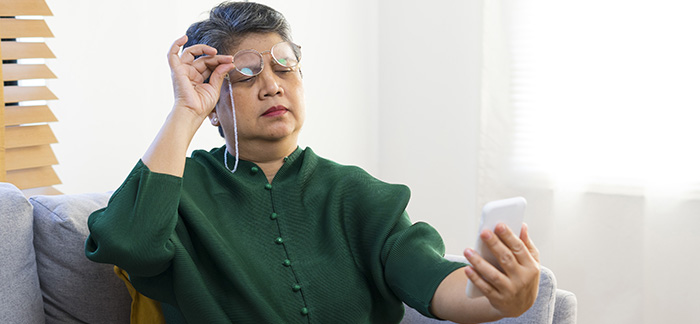
Also known as hyperopia, long-sightedness is a common eye condition that can be hard to detect. For most people it makes close objects appear blurry. However, for some people with significant long-sightedness, vision can be blurry for things in the distance as well.
A simple explanation of long-sightedness is when the eye does not focus light on the retina (the light-sensitive layer at the back of the eye) properly.
What are the symptoms of long-sightedness?

People who are long-sighted may:
- Find that nearby objects appear fuzzy and out of focus, but distant objects are clear.
- Have to squint to see clearly.
- Have tired or strained eyes after activities that involve focusing on nearby objects, such as reading, writing, or computer work.
- Experience headaches.
It's often not clear what causes these problems, but they're rarely a sign of any underlying condition. Sometimes long-sightedness may be a result of the genes you inherited from your parents, or a result of the lenses in your eyes becoming stiffer and less able to focus as you get older. It often affects adults over the age of 40, but can also affect people of all ages – including babies and children.
How is long-sightedness diagnosed?
Standard vision screenings might not detect long-sightedness, but an optometrist or ophthalmologist can measure how well your eye focuses as part of a comprehensive eye examination.
How do you treat long-sightedness?
Children and young adults with long-sightedness may not need any treatment, as their eyes are often able to adapt to the problem and their vision may not be significantly affected. Treatment is usually required in older adults, as your eyes become less able to adapt as you get older. In most cases you can treat long-sightedness with corrective eyewear or contact lenses specifically for reading and other close-up work. Laser eye surgery is also an option - a laser is used to change the shape of the cornea, which may mean you don't need to wear spectacles or contact lenses.
The importance of an eye examination
.jpg)
Having an eye examination at least every 2 years is advisable, but you can have a test at any point if you have concerns about your vision. An eye examination can confirm whether you're long or hort-sighted, and will ensure you are given the correct vision treatment for your condition. Even if you have no concerns about your vision, it is best to have your eyes checked to rule out any adverse eye conditions. What could be easier and more convenient than scheduling your next eye appointment with one of our qualified optometrists: https://www.specsavers.co.za/book-an-eye-test
Date Published: 14 January 2022